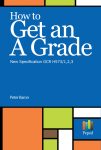Specification H573/3 Pluralism and Theology
January 9, 2018
Here is the OCR specification with hyperlinks applied to make it easy for you to resource the suggested reading. Scroll down and you will find my comments designed to help you understand the key issues in this part of the specification, and how they relate to other two papers, or other parts of Christian Thought. If yo u wish to understand fully how the specification hangs together, then try my new book – How to Get an A Grade, where I analyse the specification in microscopic detail….available in the peped shop with our new study guides for each paper. Finally, if you need a tutor, we now have tutors available at a fair hourly rate. Just email me for details, peterbaron@peped.org.
u wish to understand fully how the specification hangs together, then try my new book – How to Get an A Grade, where I analyse the specification in microscopic detail….available in the peped shop with our new study guides for each paper. Finally, if you need a tutor, we now have tutors available at a fair hourly rate. Just email me for details, peterbaron@peped.org.
4. Development: Religious pluralism and theology
Significant social and historical developments in Christian thought, such as those influenced by ethics,
philosophy or studies of religion.
4.1 Content
• The teaching of contemporary Christian theology of religion on:
– exclusivism
– inclusivism
– pluralism
4.2 Knowledge
• Exclusivism: the view that only Christianity fully offers the means of salvation
• Inclusivism: the view that although Christianity is the normative means of salvation, ‘anonymous’ Christians may also receive salvation
• Pluralism: the view that there are many ways to salvation, of which Christianity is one path
4.3 Issues as the basis of exam questions
Learners should have the opportunity to discuss issues related to religious pluralism and Christian theology of religion, including:
• whether or not if Christ is the ‘truth’ there can be any other means of salvation
• whether or not a loving God would ultimately deny any human being salvation
• whether or not all good people will be saved
• whether or not theological pluralism undermines central Christian beliefs
4.4 Suggested scholarly views, academic approaches and sources of wisdom and authority
Learners will be given credit for referring to any appropriate scholarly views, academic approaches and sources of wisdom and authority, however the following examples may prove useful:
• Hick, J. (1995) God and the Universe of Faiths, SCM Press, Chapters 1 and 10
• McGrath, A. (2010 5th Edition) A Christian Theology, Wiley-Blackwell, Chapter 17
• D’Costa, G. (2009) Christianity and World Religions, Wiley-Blackwell, Chapter 5






0 Comments